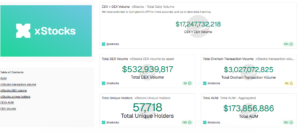The race to attract crypto investors is heating up.
While some traditional financial institutions had already begun experimenting with blockchain products, regulatory shifts in the US in 2025 have sharply accelerated crypto’s push into mainstream finance.
Roger Bayston, Franklin Templeton’s head of digital assets, told DL News that the speed at which crypto firms are entering securities-related businesses is significantly faster than that of financial institutions adopting blockchain technology.
“There’s the ‘have-wallet’ ecosystem, and the ‘want-wallet’ ecosystem,” Bayston said, characterising these two groups.
“The ‘have-wallet’ ecosystem is likely to journey into the securities-related businesses faster than the ‘want wallet’ ecosystems.
Crypto encroachment
In the past few weeks, Bayston’s “have-wallet” players have indeed stormed traditional finance en masse.
On Wednesday, Ondo Finance, a tokenisation platform, announced that it would enable users to trade tokens representing over 100 stocks and exchange-traded funds on Ethereum.
‘The “have-wallet” ecosystem, which was tremendously influential in the election.’
Roger Bayston, Franklin Templeton’s head of digital assets
Earlier this year, heavyweight crypto exchanges, including Kraken and Coinbase, announced plans to offer users stock trading as well.
This influx is largely due to the drastic changes in the US under President Donald J. Trump.
In July, he signed into law landmark legislation that makes the issuance of stablecoins legal for banks and non-banks.
Trump-appointed commissioners at the Securities and Exchange Commission have either paused or halted several high-profile lawsuits against numerous crypto companies, too.
“The ‘have-wallet’ ecosystem, which was tremendously influential in the election, and got them regulations melted away, and many new ideas moving forward,” Bayston said.
Traditional financial institutions, by contrast, have gradually inched onto the blockchain over the past few years.
First movers
Franklin Templeton was one of the first, after it launched its BENJI fund on Ethereum in 2021. Other prominent brands, such as BlackRock, the $12 trillion asset manager, launched a similar money market fund in November 2024.
These days, the tokenisation market, a niche representing the total of various financial instruments that exist on the blockchain, is now worth more than $28 billion, according to RWA.xyz.
Bayston believes these two disparate worlds will soon merge into a single market, portfolio by portfolio — so long as a business can cater to the full range of investor interests.
“It’s going to be a 24/7 environment where you can highly customise your portfolio, and the more customisation that can be delivered, the stickier the assets are for that platform,” he said.
Naturally, Bayston and Franklin Templeton expect to be well placed for this transition.
“Navigating that kind of in-between space as all of these things move forward is something we find to be a very promising thing to be doing.”
Liam Kelly is a DeFi Correspondent at DL News. Got a tip? Email at liam@dlnews.com.
